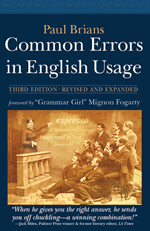In long, complicated sentences, people often lose track of whether the subject is singular or plural and use the wrong sort of verb. “The ultimate effect of all of these phone calls to the detectives were to make them suspicious of the callers” is an error because “effect,” which is singular, is the subject. If you are uncertain about whether to go with singular or plural, condense the sentence down to its skeleton: “The effect . . . was to make them suspicious.”
Another situation that creates confusion is the use of interjections like “along with,” “as well as,” and “together with,” where they are often treated improperly as if they meant simply “and.” “Aunt Hilda, as well as her pet dachshund, is coming to the party” (not “are coming”).
A compound subject requires a plural verb even if the words which make it up are themselves singular in form: “widespread mold and mildew damage [not damages] the resale value of your house.”
If the title of a work is in the plural, you still use a singular verb because it is just one work: “Great Expectations is a great novel, and so is Little Women.” That much seems obvious, but it might not seem quite so obvious that Plutarch’s Lives is a single work, or that Shakespeare’s Sonnets is. Of course if you are not referring to the book as a whole but to the individual poems they are “Shakespeare’s sonnets,” and take a plural verb.
Amounts of money and periods of time are usually considered singular: ten dollars is not a lot of money to lend someone, and five years is a long time to wait to be repaid.
BUY THE BOOK!
